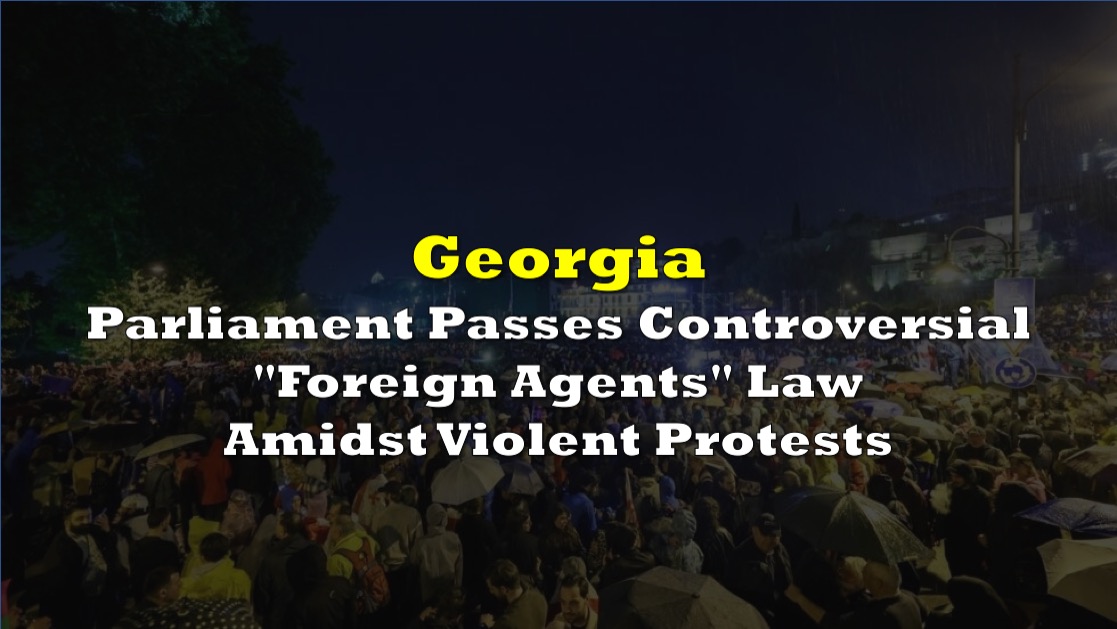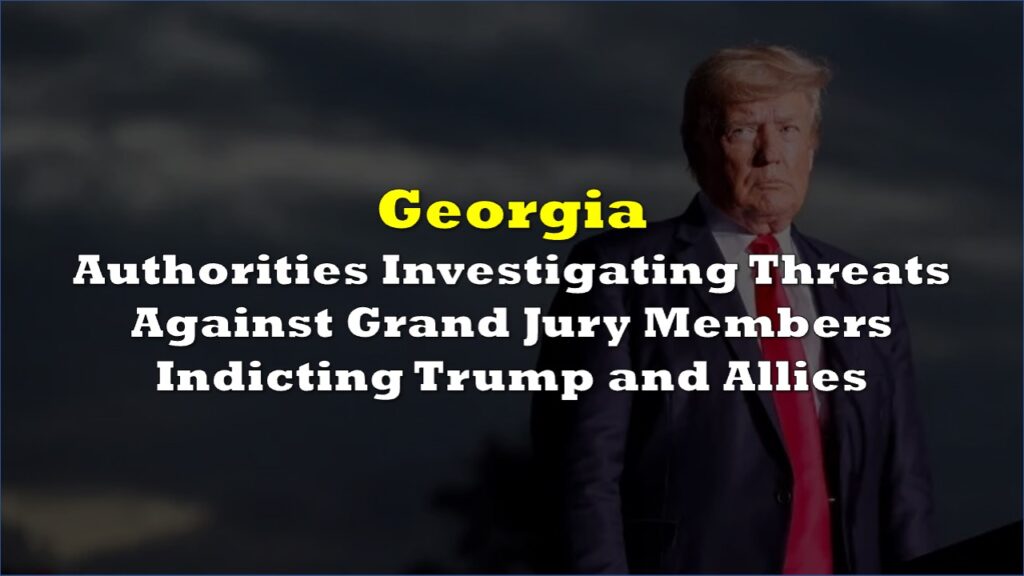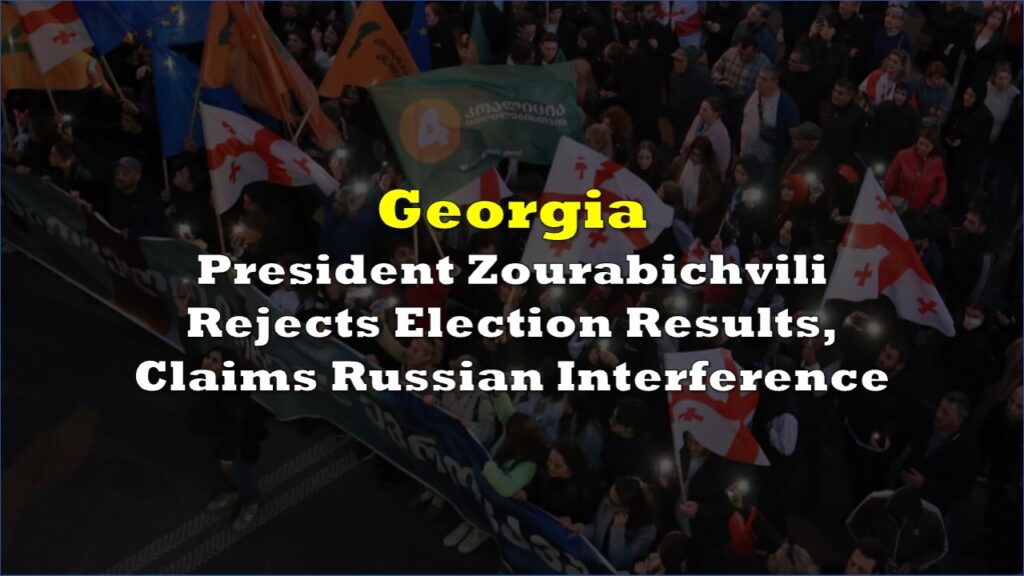Georgia’s parliament has voted in favor of a controversial “foreign agent” law, sparking weeks of mass street protests and widespread unrest in the capital city, Tbilisi. The bill, which passed its third and final reading with 84 votes against 30 on Tuesday, faces a likely veto by President Salome Zourabichvili, though the parliament has enough votes to override her decision.
Critics, who dub the bill the “Russia law,” argue it poses a significant threat to civil liberties. Thousands of protesters gathered near the parliament to express their disapproval, with tensions escalating into physical and verbal confrontations between pro-government and opposition MPs inside the parliament. Clad in full riot gear, police arrested several individuals attempting to breach the iron barriers surrounding the building.
Prime Minister Irakli Kobakhidze warned on Monday that backing down from the bill’s third reading would jeopardize Georgia’s sovereignty, drawing a stark and somewhat ambiguous parallel to the situation in Ukraine. Despite the government’s firm stance, Natia Seskuria, a former member of Georgia’s National Security Council, stated that the public’s determination to protest would not wane, describing the law as an “existential threat” to the nation’s survival.
Zourabichvili, a known opponent of Kobakhidze, confirmed her intention to veto the law as she entered the parliament. However, the ruling Georgian Dream party, in power since 2012, holds a parliamentary majority sufficient to override the veto.
Opponents fear the law could be used to suppress dissent and draw uncomfortable comparisons to a similar 2012 law in Russia, which the Kremlin has utilized to silence critics. The European Union has also expressed concerns, warning that the bill could hinder Georgia’s bid for full EU membership, which is a crucial objective for the country.
The legislation’s passage comes just five months before Georgia’s parliamentary elections. Many protesters view this as an opportunity to unseat the Georgian Dream party. A 27-year-old protester, who chose to remain anonymous due to safety concerns, told AFP, “We are waiting for when we will have a choice to choose a new government.”
Photos and videos circulating online depict violent clashes between police and protesters, underscoring the intense public opposition that has gripped the Caucasus country for nearly a month.
🧵 🇬🇪1) Let’s go through the past 24h in Tbilisi, Georgia. A lot has happened during the night and morning hours. From the result today, we know, this is not the end.
— Їne Back Їversen (@IneBackIversen) May 13, 2024
Protesters have gathered for days already, but this night was of particular importance.
Here’s a breakdown : pic.twitter.com/u7sbTdpvKA
Foreign agent law
Kobakhidze has dismissed calls for significant amendments to the bill, insisting on its passage. “We are not planning any substantial changes,” he stated, reinforcing his determination to secure a vote on Tuesday.
The new legislation mandates NGOs and independent media receiving over 20% of their funding from foreign sources to register as organizations “bearing the interests of a foreign power.” They would also be subject to Justice Ministry oversight and potentially hefty fines of up to 25,000 GEL ($9,400) for non-compliance.
The controversial law has raised alarms both domestically and internationally. Many fear it will be used to suppress dissent and curtail the activities of NGOs and independent media, much like its Russian counterpart. European Union officials have warned that the bill could jeopardize Georgia’s EU membership prospects, with European Commission President Ursula von der Leyen expressing “great concern” over the developments.
Georgia has been navigating a delicate geopolitical balance since gaining independence from the Soviet Union in 1991. The country has faced aggression from Russia, including a 2008 invasion that resulted in Russia occupying about 20% of Georgia’s internationally recognized territory. This backdrop amplifies the fear among many Georgians that the new law could pivot the country back towards Russian influence.
Polling indicates that around 80% of Georgians support EU membership, and this pro-European sentiment has fueled the ongoing protests. Demonstrators, waving EU flags, have clashed with police, resulting in arrests and the use of water cannons. A recent rally saw approximately 50,000 participants, underscoring the public’s strong opposition to the bill.
In contrast, Georgian Dream has organized counter-protests, featuring a rare public speech by its billionaire founder, former Prime Minister Bidzina Ivanishvili. Addressing supporters, Ivanishvili accused Georgia’s political elite of being manipulated by foreign interests and pledged to confront his political adversaries following the upcoming parliamentary elections.
The international community has responded with concern. White House national security adviser Jake Sullivan emphasized the critical choice facing Georgian lawmakers, urging them to support the country’s Euro-Atlantic aspirations rather than adopt a “Kremlin-style foreign agents’ law.” The Kremlin, however, dismissed these concerns, claiming that the law aims to protect national sovereignty from foreign interference.
Riots from streets to parliament
The passage of the bill has intensified opposition and sparked large-scale demonstrations. Riot police deployed teargas to disperse the noisy but predominantly peaceful crowd gathered outside the parliament, resulting in several protesters needing medical attention. Police were seen dragging away individuals amidst the chaos.
Inside the parliament, tensions erupted into violence, with a dozen MPs engaging in physical brawls. Security guards had to restrain a member of the ruling Georgian Dream party as he lunged aggressively at Levan Khabeishvili, the chair of the main opposition.
🔴17) Meanwhile, on the inside the Committee on Legal Affairs of the Georgian Parliament took no less then 1 MIN & 7 SEC 🙄to support the bill “On the Transparency of Foreign Influence” aka “Russian law” meaning the draft will be put to a vote at the plenary session tomorrow. pic.twitter.com/8ypONBTlQp
— Їne Back Їversen (@IneBackIversen) May 13, 2024
Initially, police forces managed to clear protesters from Rustaveli Avenue in front of the imposing parliament building. However, as the evening progressed, the crowd swelled and the police retreated amid whistles and jeers from demonstrators.
In a powerful display of national unity and resistance, tens of thousands of protesters, undeterred by the rain, sang Georgia’s national anthem, Tavisupleba (Freedom). The demonstration also featured the playing of Beethoven’s “Ode to Joy,” the anthem of Europe, over loudspeakers, symbolizing Georgia’s aspirations towards European integration.
Students from 30 Georgian universities participated in the protests and went on strike, supported by their lecturers.
Irakli Beradze, 22, a student in Tbilisi, held up a sign reading, “Russia can’t gaslight us, we have gas masks,” and declared that he and thousands of others “would not let Russia have our country.”
Information for this story was found via BBC, CNN, The Guardian, and the sources mentioned. The author has no securities or affiliations related to the organizations discussed. Not a recommendation to buy or sell. Always do additional research and consult a professional before purchasing a security. The author holds no licenses.









